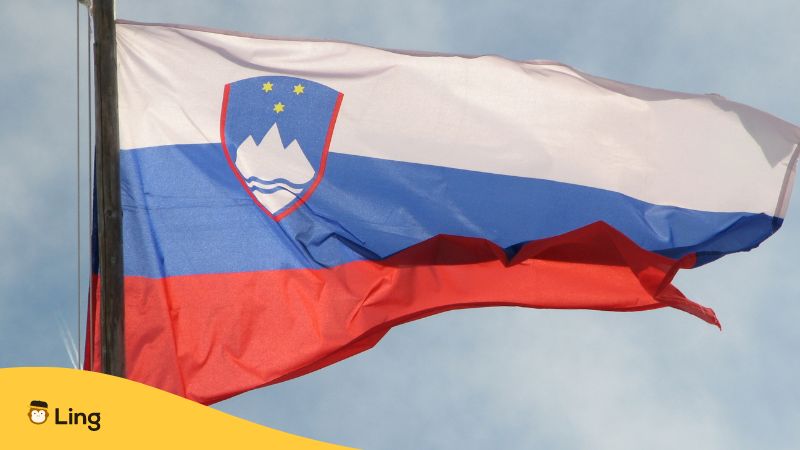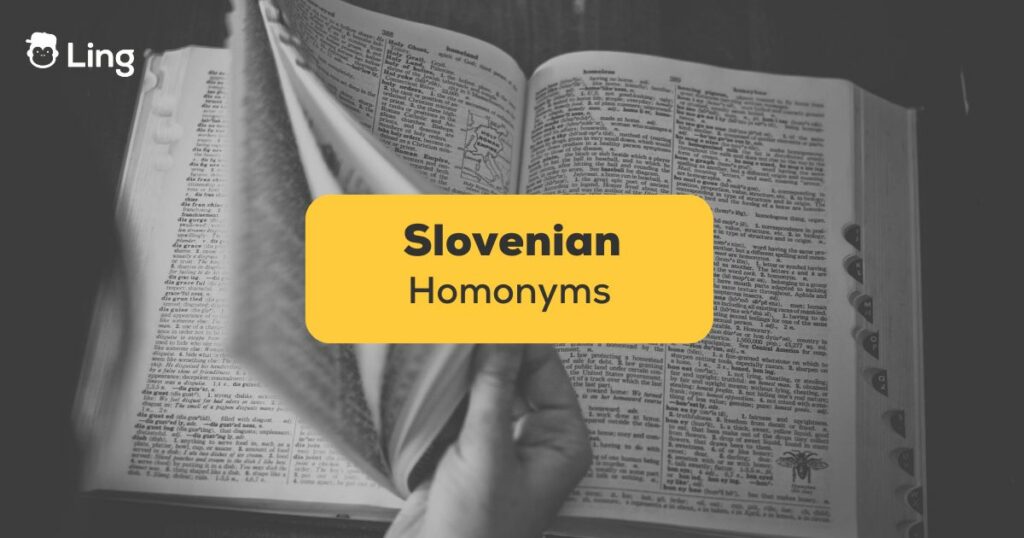Have you ever heard a word in Slovenian and thought it meant one thing but, in reality, meant something completely different? Even though some words have the same spelling and pronunciation, they can have different meanings. We call those words homonyms!
A homonym is called enakozvočnica in Slovenian, which roughly translates to “word with the same sound.” Using them wrong can sometimes lead to funny and confusing situations for those who are learning Slovenian. But don’t worry! In this guide, we’ll dive into Slovenian homonyms and break them down!
What Are Homonyms?
Homonyms are words, found in every language, that sound or are spelled the same but don’t have the same meaning. They may look similar when written or said, but they’re like sneaky word twins, each of them with its own special meaning that’s different from the other. Take the word ”bat” in English, for example – this can either be an animal or sports equipment, such as the baseball bat.
Fun fact: It may seem like there aren’t that many homonyms, but in Slovenia, they are accumulated in a specially dedicated dictionary!

Commonly Used Slovenian Homonyms
In Slovenian, we can find homonyms in everyday conversations. They make the language more interesting and sometimes a bit puzzling. Let’s take a look at some common homonyms we can hear in daily life.
Prst
The word prst can have two meanings in Slovenian. It can either mean finger or soil (as in, where the plants grow). So, if you want to translate the sentence ”He put his finger into the soil,” you can say: ”Prst je dal v prst’.’
List
List can be ”paper,” as in the sheet on which you can draw or write. The second meaning of the word is ”leaf”, or the green part of a plant that grows from a branch.
Vila
The word vila can refer to an urban residence house or a fairy godmother. If you put the word in plural, it becomes vile and gets an additional meaning. Vile is a name for a pitchfork. Therefore, vile can mean the plural of houses, fairies, and a pitchfork!
Moder
When you say to someone that they’re moder, it means they’re smart and knowledgeable. But it may also mean that they are blue! And no, I don’t mean they are sad or down – literally, the color blue.
Jezik
Jezik can either mean tongue, like the organ in your mouth, or a language. For example, slovenski jezik means the Slovenian language.
Klop
Klop can be a bench that you sit on at the park. On the other hand, it can also be the tiny creature that’s hiding in bushes and waiting to lash onto those who pass by – the tick! So, “Sedim na klopi v parku” means “I’m sitting on a bench in the park,” and “Včeraj me je ugriznil klop” means “Yesterday I was bitten by a tick.”

Homonym Verbs In Slovenian
In Slovenian, certain verbs can have two different meanings at once. They can cause confusion because they sound alike but have different jobs in sentences. This is where you gotta pay close attention to the context! Here are some simple sentence examples to make it easier to understand:
Delati
| Verb Meaning | Slovenian Sentence | English Translation |
|---|---|---|
| to work | Petra dela v pisarni | Petra works in the office. |
| to do | Otroci delajo domače naloge | Children are doing their homework. |
Stati
| Verb Meaning | Slovenian Sentence | English Translation |
|---|---|---|
| to stand | Stati v vrsti | To stand in line. |
| to cost | Koliko stane ta obleka? | How much does this dress cost? |
Kopati
| Verb Meaning | Slovenian Sentence | English Translation |
|---|---|---|
| to bathe | Dekle se kopa v reki | A girl is bathing in the river. |
| to dig | Arheolog kopa luknjo | The archaeologist is digging a hole. |
Stopiti
| Verb Meaning | Slovenian Sentence | English Translation |
|---|---|---|
| to melt | Led se stopi v vodi | The ice melts in the water. |
| to step | Marko stopi na stopnico | Marko steps on a step. |
Zapeti
| Verb Meaning | Slovenian Sentence | English Translation |
|---|---|---|
| to fasten | zapeti zadrgo | To fasten the zipper. |
| to sing | zapeli so mu za rojstni dan | They sang for his birthday. |
Other Interesting Examples Of Homonyms In Slovenian
Here are two sentences that may seem odd but actually make perfect sense!
Gori na gori gori – Yes, this is an actual sentence. When translated, it would mean ”it’s burning up on the mountain.” You see, each “gori” has its own meaning: Gori (up) na gori (on the mountain) gori (it’s burning).
Dvigalo se je dvigalo – This sentence uses the same word twice, but each means its own thing. The first “dvigalo” refers to an elevator. The second comes from the verb dvigati se, which means “to rise” or “to lift oneself.” Here, it’s conjugated as se je dvigalo, meaning “it was rising” or “it was lifting itself.”

Learn More Slovenian Words With Ling
Traveling to a new country like Slovenia can be exciting, but not speaking the language can be tricky. That’s where the Ling app comes in handy. By learning some basic Slovenian phrases, like greetings, ordering food, and asking for directions, you’ll feel more confident speaking with locals during your trip.
What’s great about the Ling app is that you can learn anytime, anywhere. Whether you’re on the bus, waiting in line, or relaxing at a café, you can practice Slovenian with interactive games and quizzes.
The Ling app is designed to meet your needs, whether you’re a beginner or more advanced. With lessons tailored to your level, you can progress at your own pace. So be the first in your friend group to download it and brag about your language skills!



































































